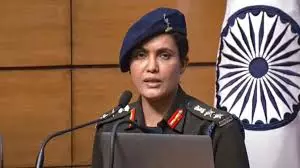Pradeep S. Mehta | Despite Pakistani Army Provocation, Communal Amity Prevailed In India
Unlike Indonesia, the largest Muslim country, Muslims in the Indian subcontinent have mainly Arabic and Persian names. It is a pity that this practice persists, hence Sanjay is a breath of fresh air

One unexpected outcome for the Pakistani Army following the Pahalgam massacre on April 22 was that, contrary to their ill intentions, no major communal unrest erupted across India.
Despite the terrorists’ barbaric act of selectively killing 26 Hindu men and cynically asking the widowed wives “to go and tell Modi”, the Indian public refused to get provoked.
This restraint underscored the deep-rooted fabric of Hindu-Muslim harmony in India, a testament to the shared history and mutual respect embedded in the DNA of both communities. The Pahalgam massacre erupted in national outrage, cutting across religions, race and regions.
However, an unfortunate aberration came in the form of a reckless remark by Kunwar Vijay Shah, a senior Madhya Pradesh government minister, who offensively insinuated that Col. Sofiya Qureshi was a “sister of terrorists” due to her religion. She was one of two armed forces officers regularly briefing the media during “Operation Sindoor”, which was launched by the Government of India to take action against terrorist camps in Pakistan. While Mr Shah did later apologise profusely, it scarcely matched the gravity of his appalling statement.
Col. Qureshi comes from a proud lineage of military service: her father and grandfather both served in the Indian Army, and she is married to a fellow Muslim officer. What the minister failed to grasp was that the Qureshi family is wholly Indian and her biological brother, in fact, is named Sanjay Qureshi.
Unlike Indonesia, the largest Muslim country, Muslims in the Indian subcontinent have mainly Arabic and Persian names. It is a pity that this practice persists, hence Sanjay is a breath of fresh air. On the other hand, many Indian Christians retain Indian names rather than Western ones.
Reverting to the subject, it is worth recalling what many famous Indian Muslims had to say about Pahalgam, Pakistan and terrorism. One of our most respected Muslim soldiers, Lt. Gen. Syed Ata Hasnain (Retd), who has been involved in the Track-2 dialogue process with Pakistanis, wrote on April 23: “To put India under intense pressure, Pakistan knows the sometimes-tenuous communal temperature can be incendiary. That is why these terrorists specifically profiled the tourists, ensuring that Hindus would be targeted and inflammatory messages addressing India’s Prime Minister would be relayed. We must ensure unity among our people despite the gravest of provocations – and this one is definitely not the last of them.”
Fortunately, the conflict lasted only four days and, on the Pakistan Army’s request, a ceasefire was agreed. Frankly, Pakistan’s economy is in a terrible state and could not have sustained a longer engagement. Despite this, the popular narrative in Pakistan is that it won the war, thus enabling the Army to restore public confidence. As part of this travesty, Gen. Asim Munir was even promoted to Field-Marshal.
To counter misinformation and present the truth globally, the Indian government formed seven teams of parliamentarians, including politicians from across parties and retired diplomats, to visit over 30 countries. The delegations also included MPs from India’s two Muslim parties -- the Indian Union Muslim League (IUML) and All-India Majlis-e-Ittehadul Muslimeen (AIMIM).
The IUML was represented by Mohammed Basheer, and the AIMIM by its chief, Asaduddin Owaisi, a strong votary of Indian Muslim interests. He said: “I am proud of the Indian armed forces. They repelled the attacks and we damaged their airbases.”
In his Hyderabad constituency, Mr Owaisi was feted with posters: “One man against terror. Exposing the enemy within for India with pride. One man spoke, Pakistan shook. A single voice unmasked Pakistan’s sanctuary for terrorism.”
A delegation led by BJP leader Baijayant Panda, including Mr Owaisi, visited key Arab countries to showcase India’s fight against terrorism. In Saudi Arabia, Mr Owaisi asserted that Indian ulemas were ahead of the Pakistanis in asserting India’s position in the Muslim theological world. He also called for Pakistan’s relisting by the Financial Action Task Force. In Algeria, he described Pakistan as the “epicentre of Takfirism”, a term for radical ideologies that label others as non-believers.
Similarly, Mr Basheer projected India’s united front effectively. “Wherever we went, we exposed Pakistan and showcased India’s unity,” he said. Another MP added: “You would not believe the solidarity the UAE, an Islamic country, showed India.”
“If there is any sense in Pakistan, they will understand our only demand is for them to give up terrorism. Some of my colleagues are not from the ruling party. I could have come alone to deliver the message, but they came with me. We’re not supporting each other’s parties, rather we’re supporting one simple idea called India,” said Congress leader and former external affairs minister Salman Khurshid.
Both he and fellow Congress leader Shashi Tharoor, who led a delegation to the US and Latin America, were hooted by their party for acting as “super spokespersons” for the BJP, a response that was both unpatriotic and sad.
At a Washington DC press conference, Mr Tharoor responded to a question by saying India would not have conducted such a massive retaliation without credible evidence against Islamabad. He further outlined reasons behind Pakistan’s clear involvement in the attack, noting its repeated use of terrorism against India and subsequent denials, despite ample evidence. He cited 26/11 and the discovery of Osama bin Laden near a Pakistani Army military academy in Abbottabad.
Copying India, Pakistan too dispatched delegations to about seven countries, but not a single one included any member from minority communities, despite a constitutional provision reserving five per cent of legislative seats for them.
The Pakistani public remains largely unaware that their Army continues to manipulate sentiment by casting India as its number one enemy while the people ultimately bear the cost. It is high time that the Pakistani people throw out the Army and restore true democracy, which can lead to peace with India and its neighbours on the western side: Afghanistan and Iran.
The writer is the secretary-general of CUTS International, a 40-year-old leading global public policy research and advocacy group.

